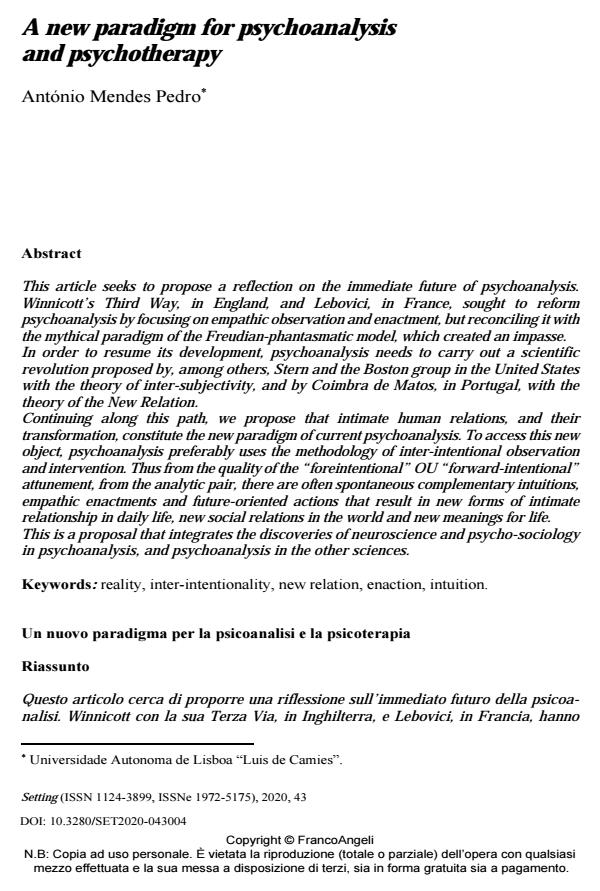A new paradigm for psychoanalysis and psychotherapy
Titolo Rivista SETTING
Autori/Curatori António Mendes Pedro
Anno di pubblicazione 2020 Fascicolo 2020/43
Lingua Inglese Numero pagine 37 P. 63-99 Dimensione file 313 KB
DOI 10.3280/SET2020-043004
Il DOI è il codice a barre della proprietà intellettuale: per saperne di più
clicca qui
Qui sotto puoi vedere in anteprima la prima pagina di questo articolo.
Se questo articolo ti interessa, lo puoi acquistare (e scaricare in formato pdf) seguendo le facili indicazioni per acquistare il download credit. Acquista Download Credits per scaricare questo Articolo in formato PDF

FrancoAngeli è membro della Publishers International Linking Association, Inc (PILA), associazione indipendente e non profit per facilitare (attraverso i servizi tecnologici implementati da CrossRef.org) l’accesso degli studiosi ai contenuti digitali nelle pubblicazioni professionali e scientifiche.
This article seeks to propose a reflection on the immediate future of psychoanalysis. Winnicott’s Third Way, in England, and Lebovici, in France, sought to reform psychoanalysis by focusing on empathic observation and enactment, but reconciling it with the mythical paradigm of the Freudian-phantasmatic model, which created an impasse. In order to resume its development, psychoanalysis needs to carry out a scientific revolution proposed by, among others, Stern and the Boston group in the United States with the theory of inter-subjectivity, and by Coimbra de Matos, in Portugal, with the theory of the New Relation. Continuing along this path, we propose that intimate human relations, and their transformation, constitute the new paradigm of current psychoanalysis. To access this new object, psychoanalysis preferably uses the methodology of inter-intentional observation and intervention. Thus from the quality of the "foreintentional" OU "forward-intentional" attunement, from the analytic pair, there are often spontaneous complementary intuitions, empathic enactments and future-oriented actions that result in new forms of intimate relationship in daily life, new social relations in the world and new meanings for life. This is a proposal that integrates the discoveries of neuroscience and psycho-sociology in psychoanalysis, and psychoanalysis in the other sciences.
Questo articolo cerca di proporre una riflessione sull’immediato futuro della psicoanalisi. Winnicott con la sua Terza Via, in Inghilterra, e Lebovici, in Francia, hanno cercato di riformare la psicoanalisi, concentrandosi sull’osservazione empatica e sull’enactment, conciliando tali aspetti con il paradigma mitico del modello freudiano-fantasmatico, creando tuttavia una situazione di stallo. Al fine di proseguire nel suo sviluppo, la psicoanalisi ha bisogno di portare avanti una rivoluzione scientifica proposta, tra gli altri, da Stern e il gruppo di Boston negli Stati Uniti con la teoria dell’intersoggettività, e da Coimbra de Matos, in Portogallo, con la teoria della Nuova Relazione. Proseguendo lungo questa strada, proponiamo che i rapporti umani intimi, e la loro trasformazione, costitui¬scano il nuovo paradigma della psicoanalisi attuale. Per accedere a questo nuovo oggetto, la psicoanalisi do¬vrebbe utilizzare preferibilmente la metodologia dell’osservazione inter-intenzionale e di intervento. Così, dalla qualità della sintonizzazione "pre-intenzionale" e "intenzionale" della coppia analitica emergono spesso intuizioni complementari spontanee, enactment empatici ed azioni orientate al futuro che si traducono in nuove forme di relazioni intime nella vita quotidiana, di nuove relazioni sociali nel mondo e di nuovi significati di vita. Si tratta di una proposta che integra le scoperte delle neuroscienze e della psico-sociologia nella psicoanalisi, e la psicoanalisi nelle altre scienze.
Parole chiave:Realtà, inter-intenzionalità, relazione nuova, enaction, intuizione.
António Mendes Pedro, A new paradigm for psychoanalysis and psychotherapy in "SETTING" 43/2020, pp 63-99, DOI: 10.3280/SET2020-043004